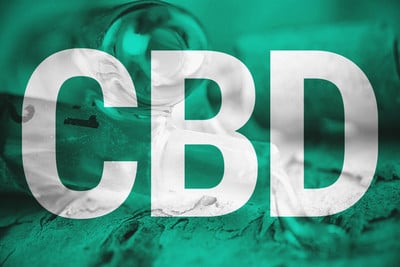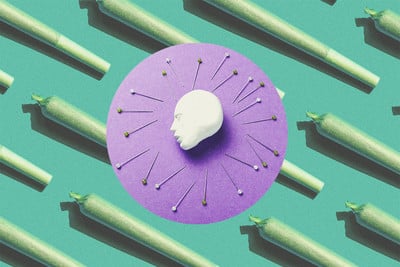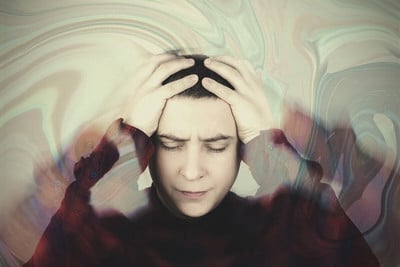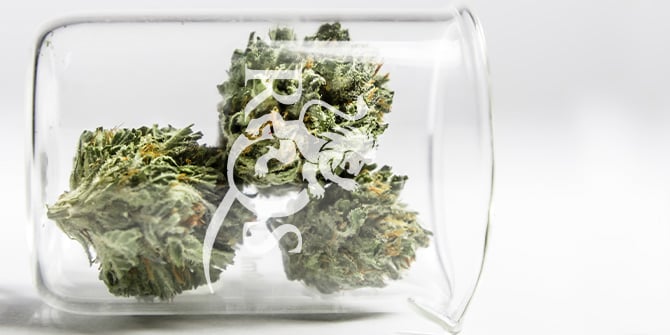How To Dose CBD: Oils, Creams, Vapor, And More
![How To Properly Dose CBD Oil [Calculator Inside] How To Properly Dose CBD Oil [Calculator Inside]](/img/cms/cover_8.jpg)
![How To Properly Dose CBD Oil [Calculator Inside] How To Properly Dose CBD Oil [Calculator Inside]](/img/cms/0-filters-img-mobile-1_24.jpg)
Contents:
From oils and e-liquids to suppositories, CBD comes in countless forms. In this article, we take a close look at how to dose CBD products and maximise their efficacy.
Introducing: CBD And The Endocannabinoid System
CBD, or cannabidiol, is a cannabinoid found in cannabis plants. Like other phytocannabinoids (plant-derived cannabinoids), CBD has the ability to interact with the endocannabinoid system (ECS).
The ECS serves as a regulatory system made up of two types of internally produced endocannabinoids (anandamide and 2-AG), two types of receptors (CB1 and CB2), and enzymes that help to synthesise, transport, and metabolise cannabinoids throughout the body.
The cannabinoids found in cannabis have the ability to interact with our endocannabinoid system due to their molecular similarity to endocannabinoids. THC, for example, has a chemical structure very similar to anandamide and fits into CB1 receptors like a key fits into a lock. When it does, it can either stimulate or inhibit endocannabinoid activity.
Unfortunately, CBD’s comprehensive mechanism(s) of action hasn’t been fully elucidated yet. Unlike THC, it has little affinity for CB1 and CB2 and instead has been shown to interact with serotonin, GABA, and TRPV1 receptors.
When CBD interacts with these receptors, it has the potential to interact with a variety of bodily processes associated with well-being.
CBD Dosage Guide: How To Correctly Dose CBD
Like with any supplement, properly dosing CBD is super important. Unfortunately, finding the right dose of CBD can be confusing, seeing as doses vary based on:
• The person’s weight
• The potency of the CBD supplement
• The route of administration
• The desired effect
Finding the right dose is very much a process of trial and error. Hence, we always recommend starting with a low dose and gradually building your way up until you hit a “sweet spot”. To help you achieve this, use the dosage guide below to know where to start.
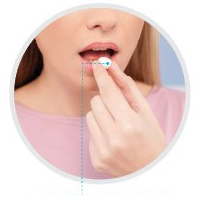 CBD Capsules5 - 20 min
CBD Capsules5 - 20 min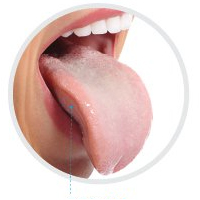 CBD Oil5 - 20 min
CBD Oil5 - 20 min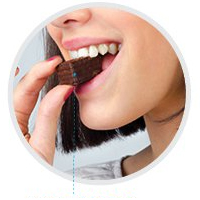 CBD Edibles30 min - 2 h
CBD Edibles30 min - 2 h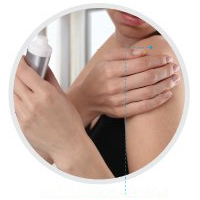 CBD Topicals10 min
CBD Topicals10 min CBD Capsules5 - 20 min
CBD Capsules5 - 20 min CBD Oil5 - 20 min
CBD Oil5 - 20 min CBD Edibles30 min - 2 h
CBD Edibles30 min - 2 h CBD Topicals10 min
CBD Topicals10 minDosing Oral CBD
Oral administration is easily the most common form of taking CBD. There are two ways of taking CBD orally:
• Under the tongue (sublingual administration): Sublingual dosing is technically distinct from oral dosing as the CBD is absorbed via the oral mucosa under the tongue and inside the cheek. This way, it is delivered to the bloodstream almost immediately and bypasses the digestive system, causing effects to take place within 10–15 minutes.
• Swallowing CBD: Swallowing CBD in any form, whether it’s a gummy bear, capsule, pill, or CBD oil, requires the CBD to be broken down in the digestive tract in order to take effect. This can take anywhere from 20 minutes to an hour depending on the type of edible, your metabolism, and whether you have food in your stomach. When swallowed, the effects of CBD tend to kick in slower and last longer (up to four hours).
If you’ve never tried CBD, we recommend starting with a mid-strength oil or capsule. Our 10% CBD oil, for example, are a great entry point for those who have never used CBD before.
Start with a single 5mg dose on your first day just to gauge your body’s reaction. On the next day, step things up with a single 10mg dose and stick to that for at least a week.
Experiment with taking the dose in the morning or in the evening to achieve the effects you’re looking for. If you’re not getting the desired effect after one week on a daily 10mg dose, step things up to 15mg per day. Stick to that dose for another week before increasing it further.
If after another week you’re not experiencing the effects you're looking for, increase your dose by another 5mg. Stick to this dose for another week before adjusting again.
 CBD Dosage Calculator
CBD Dosage Calculator
 CBD Dosage Calculator
CBD Dosage Calculator
Dosing Inhaled CBD
Dosing inhaled CBD is a little trickier than dosing sublingual oils and swallowing edibles. First of all, inhaled CBD has a much higher bioavailability (meaning you’ll need smaller doses than you would from oral administration). And second, everybody inhales differently, meaning doses can be a little inconsistent from one person to another.
If you’re new to CBD, start with a low-to-medium strength cartridge or e-liquid.
To get your dose right, start with a single hit from your vape. Inhale gently for 8–10 seconds, and remember that there’s no need to hold the vapor in your lungs for an extended period.
Vaporized CBD is absorbed really quickly, and its effects should set in within 1–3 minutes. But, they also subside within two hours. Depending on the effects you’re after, you may need to dose multiple times a day. However, remember to wait at least 15 minutes to gauge the effects of the CBD before taking another dose.
![How To Properly Dose CBD Oil [Calculator Inside] How To Properly Dose CBD Oil [Calculator Inside]](/img/cms/vaping_1.jpg)
![How To Properly Dose CBD Oil [Calculator Inside] How To Properly Dose CBD Oil [Calculator Inside]](/img/cms/vaping-.jpg)
Dosing Topical CBD
Topical CBD products (like balms, oils, creams, or lubricants) do not enter the bloodstream (unlike oral or vaporized CBD). Instead, they interact with the endocannabinoid system via receptors in the skin.
For best results, make sure you follow the instructions that come with your particular product. Also, remember to test any CBD product on a small section of your skin first to gauge the reaction.
Dosing Vaginal CBD And CBD Suppositories
CBD suppositories are pill-sized products designed to be inserted into the vagina or rectum where they are absorbed by local mucous membranes. This process is similar to taking CBD sublingually, with an onset of roughly 15 minutes and effects that last around two hours.
Dosing vaginal suppositories will depend on the effects you’re after. Some suppositories, for example, contain 50mg per dose; but this figure can vary from one manufacturer to the next. Always stick to the dosage instructions that come with your particular product, and consult your doctor first before using suppositories.
Does CBD Produce Side Effects?
Side effects are an important consideration when taking a new supplement. Luckily, CBD usually doesn’t produce any side effects. And in the rare case it does, they are very mild and easy to control with proper dosing.
Side effects of CBD may include:
• Tiredness
• Diarrhoea
• Appetite/weight changes
In rare cases, some people have noted the following side effects of CBD:
• Headaches
• Dry mouth
• Lightheadedness/drowsiness
• Low blood pressure
Is CBD Psychoactive?
This is an important consideration for those new to cannabis products. Unfortunately, there is a lot of misinformation regarding the psychoactive profile of CBD supplements.
First and foremost, CBD doesn’t produce the psychoactive effect associated with cannabis. This “high” comes courtesy of THC, the main intoxicating cannabinoid found in marijuana. Most CBD supplements are derived from hemp, a variety of cannabis bred for industrial purposes that only contains trace amounts of THC.
![How To Properly Dose CBD Oil [Calculator Inside] How To Properly Dose CBD Oil [Calculator Inside]](/img/cms/cbd_6.jpg)
![How To Properly Dose CBD Oil [Calculator Inside] How To Properly Dose CBD Oil [Calculator Inside]](/img/cms/cbd-.jpg)
Does CBD Interact With Medications?
CBD is metabolised by cytochrome P450 enzymes. These enzymes are found in the liver and are responsible for metabolising roughly 60% of all medications currently found on the market.
When you take CBD, it will compete to be metabolised by cytochrome P450 enzymes. If it succeeds, it may extend the half-life of medications in your bloodstream. Hence, it is extremely important you consult your doctor before integrating CBD into your routine.
Is CBD Legal?
Governments across the globe have different policies regarding CBD. In the US, for example, CBD products are legal in all 50 states given they are derived from hemp and contain less than 0.3% THC. Most European countries have similar laws, considering any CBD product legal as long as it contains less than 0.2% THC.
What Are The Benefits Of CBD?
The endocannabinoid system is involved in managing a wide variety of bodily processes, from memory and sleep to inflammation.
There’s still a lot we don't know about CBD and the other constituents of cannabis. So far, however, early research is examining the link between CBD and the following:
- Pain, both neuropathic and inflammatory
- Anxiety and stress
- Depression
- Chronic inflammation
- Appetite and metabolism
- Sleep
- Seizures and tremors
- Vomiting and nausea
While there’s a lot of discussion concerning the medical potential of CBD, it’s thought the compound helps to promote homeostasis, a state of equilibrium that keeps the body functioning at its best.
If you plan to use CBD, always consult your physician about how and why you plan to use it. Also, remember to pay close attention to dosage and administration method to ensure you find the best dose for you.
Medical DisclaimerInformation listed, referenced or linked to on this website is for general educational purposes only and does not provide professional medical or legal advice.
Royal Queen Seeds does not condone, advocate or promote licit or illicit drug use. Royal Queen Seeds Cannot be held responsible for material from references on our pages or on pages to which we provide links, which condone, advocate or promote licit or illicit drug use or illegal activities. Please consult your Doctor/Health care Practitioner before using any products/methods listed, referenced or linked to on this website.
Categories
Medical Marijuana



























